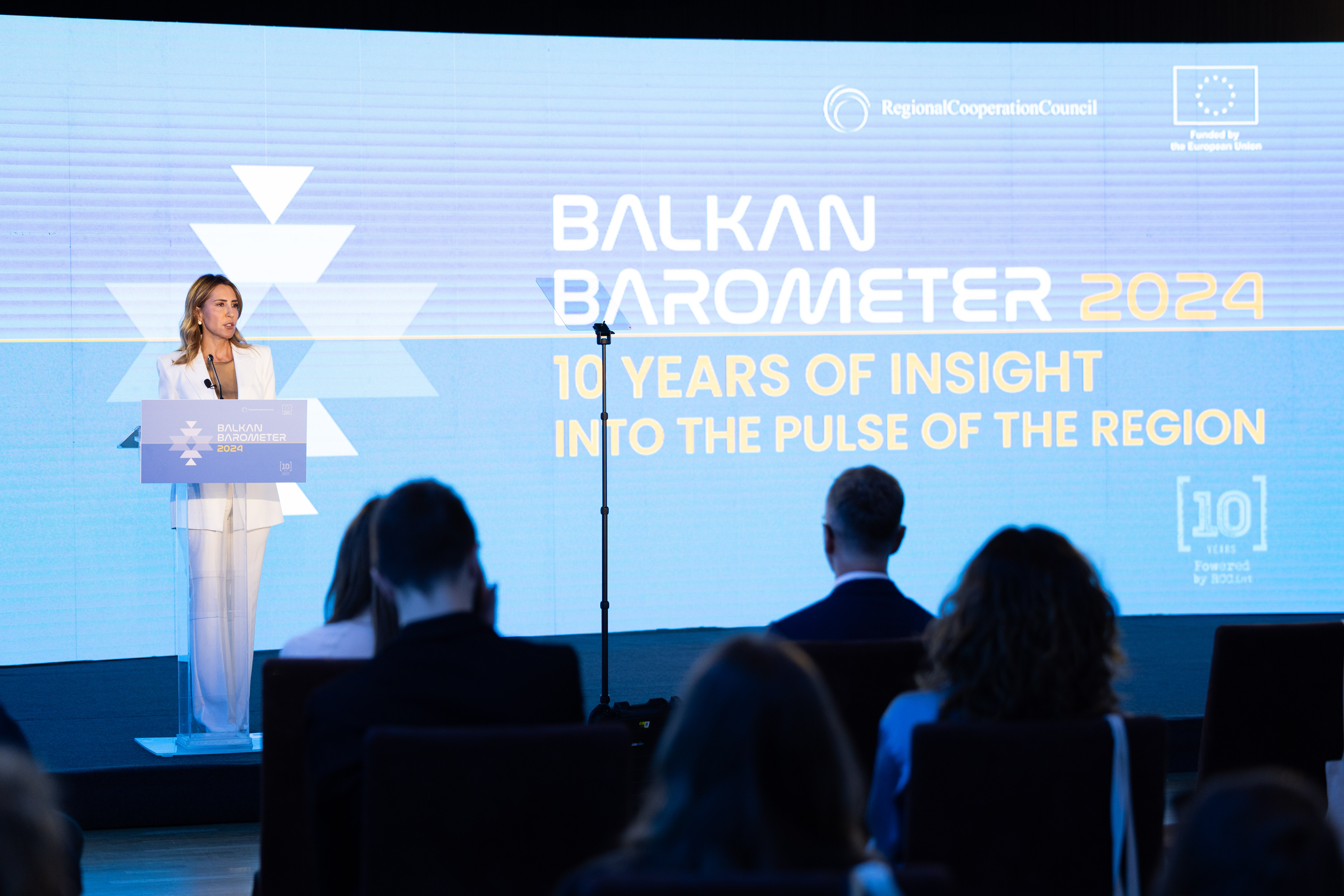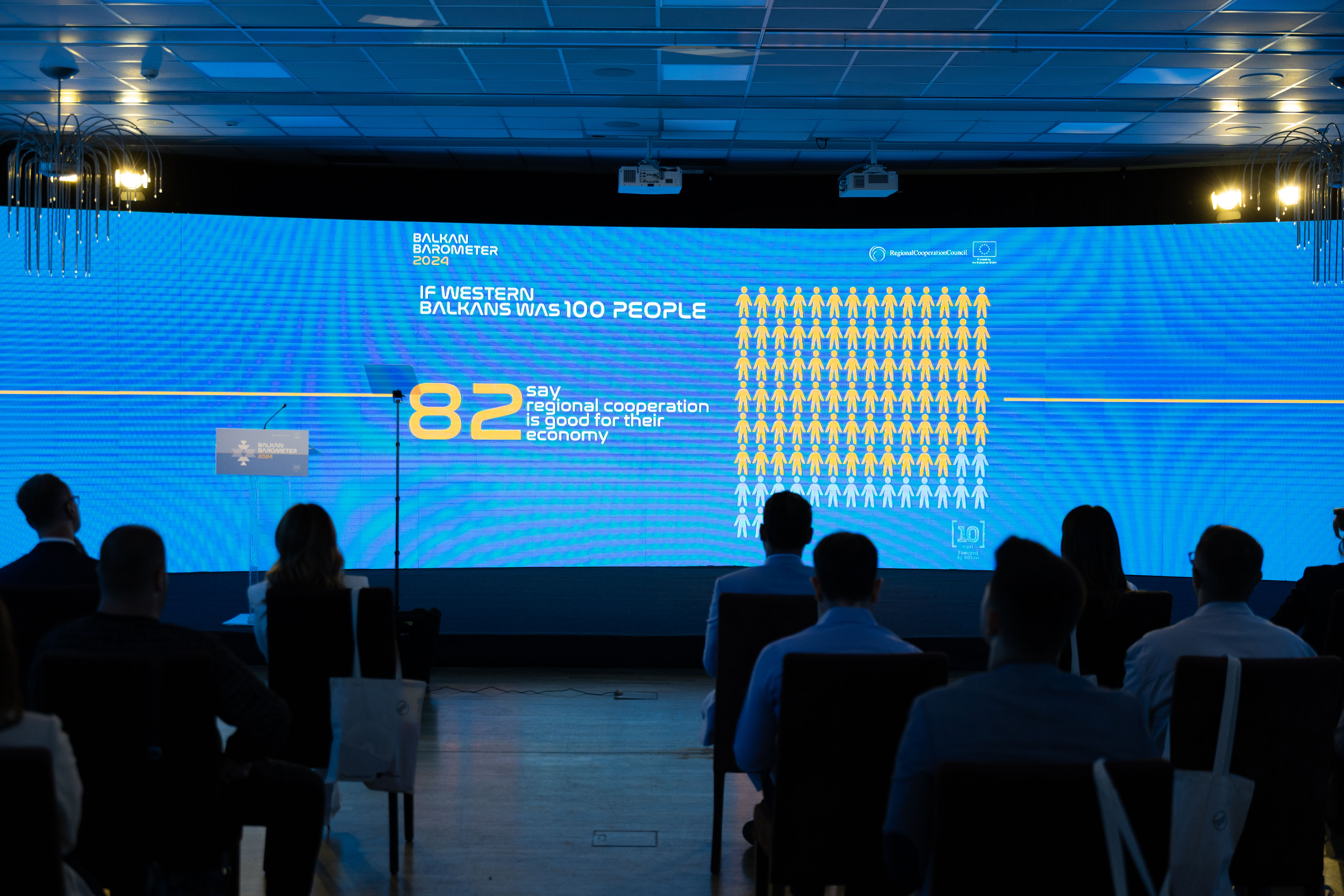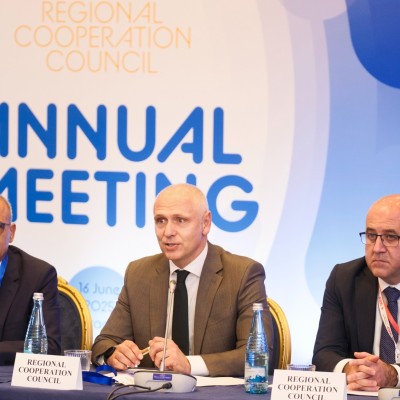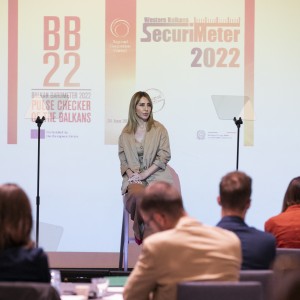RCC presents the 10th edition of Balkan Barometer - region's largest public and business opinion survey Bregu: Trust in regional cooperation continues to rise, reaching record 82% this year
16 September 2024

RCC Secretary General Majlinda Bregu at the presentation of Balkan Barometer 2024 on 16 September 2024 (Photo: RCC/Henri Koci)

RCC Secretary General Majlinda Bregu presenting Balkan Barometer 2024 on 16 September 2024 in Tirana (Photo: RCC/Henri Koci)

Presentation of Balkan Barometer 2024 data took place in Tirana on 16 September 2024 (Photo: RCC/Henri Koci)
Balkan Barometer database now available at WWW.RCC.INT/BALKANBAROMETER
Tirana - The Regional Cooperation Council (RCC) presented the tenth edition of Balkan Barometer, the region's largest public and business opinion survey, in Tirana today.
The event was opened by RCC’s Secretary General Majlinda Bregu and Head of the European Union Delegation to Albania Silvio Gonzato followed by a presentation of Balkan Barometer findings through the Regional Fireside Talks between RCC Secretary General, Ms Bregu, and the audience consisting of young representatives of regional youth organisations.
WATCH VIDEO OF RCC SG PRESENTING MAIN BALKAN BAROMETER FINDINGS
“Balkan Barometer reveals that hiking prices and inflation are the biggest worry this year for the people of Western Balkans, who for the past decade worried most about either economic situation or unemployment. This change doesn’t come as a surprise, given that inflation in the Western Balkans is nearly double that of the EU (8.1% to 3.4% respectively), while food prices are almost the same as in the EU. Yet, our GDP is just half of that of the EU," said RCC Secretary General Majlinda Bregu presenting the main findings of the survey.
"Things are changing—not only the circumstances around us but also our own perspectives. Support for EU membership, started at 39% in 2015, reached its peak of 62% in 2021 and from that moment, the decline started. Today, it stands at 54% —the lowest in six years. This enlargement fatigue is also reflected, though to a lesser extent, in business circles. While support for EU membership among business leaders has dropped by 7% over the past year, it still remains higher than amongst the general public, with 64% still in favour. Despite this, many citizens remain hopeful. Forty-three percent believe that EU accession will happen by 2035, while a quarter think it will take longer. Encouragingly, fewer people than last year, 18%, believe their economy will never join the EU—a 10-point drop since 2022," added Bregu.
This annual survey has been conducted amongst six thousand people and 1200 businesses from the entire Western Balkans, giving an overview of their opinions on regional cooperation, EU integration, trust in the public institutions and media, their biggest concerns, employment, climate change, security, digital life, transport, rule of law, travel, etc. Since its launch in 2015, the survey talked to over 65,000 citizens and nearly 13,500 businesses showcasing their opinions.
Results are available in the database at https://www.rcc.int/balkanbarometer/.
"On a positive note, trust in regional cooperation is rising. This year, a record 82% of citizens expressed their support for it—the highest score since the launch of the Balkan Barometer in 2015. This underscores that regional cooperation is having a value of its own, rather than being approached as years ago in the context of European integration. However, nationalist politics continue to be seen as a major obstacle to regional cooperation. Though trust and optimism in the region remain cautious, there are signs of improvement in how people perceive these issues, as public opinion evolves as fast as political courage allows," concluded Bregu.
Some of the Balkan Barometer main findings:
- Public sentiment is improved: from 35% in 2015 to 49% now.
- In 2020, 26% of the region’s citizens were of the opinion that Western Balkans gives them hope, but now this stands true only for 12%.
- In 2024, the predominant feeling is “Conflict” with 22%.
- 20% of Western Balkan citizens are hopeful to joining the EU by 2030, while 23% expect it to happen between 2030 and 2035. In 2015, 27% believed it will happen by 2020 and 21% by 2025.
- Fewer people, 18%, believe their economy will never join the EU, a 10 percent point decrease from 2022.
- When we asked citizens in 2021 if they were willing to work in Western Balkans only 7% responded positively, while now in 2024, 22% of them are willing to do so.
- The trust in institutions is in the same low patterns: political parties remain the least trusted with 74%.
Watch video on 10-year trends
Watch video showing Western Balkan youth opinions
MAIN FINDINGS Balkan Barometer Public Opinion
MAIN FINDINGS Balkan Barometer Business Opinion
Balkan Barometer DATABASE Public Opinion
Balkan Barometer DATABASE Business Opinion
More INFO on Balkan Barometer: www.rcc.int/balkanbarometer
***
Balkan Barometer is commissioned by the RCC and financed by the European Union. It is conducted each year since 2015 by an independent agency among 6,000 citizens and 1,200 companies throughout the region.
The 2024 edition of the Balkan Barometer Public Opinion Survey was conducted using a quantitative research approach, employing the Computer-Assisted Personal Interviewing (CAPI) method. Data was collected via direct, face-to-face household interviews by trained interviewers from Data Centrum Research Institute between 5 March and 4 April 2024 in Albania, Bosnia and Herzegovina, Kosovo*, North Macedonia, Montenegro, and Serbia.
The Balkan Barometer is firmly established as a reliable source of regional data widely employed and referenced by media, businesses, civil society and decision-makers alike.
Part of this year’s presentation of Balkan Barometer were a Regional Fireside Talks between region’s youth and High-Level Officials. These talks are envisaged to become a regular practice of dialogue between high-ranking officials and youth from the region, thus encouraging youth to freely discuss youth needs on an equal basis with policy makers. Fostering such dialogue contributes to sustainable practice of youth engagement through dynamic fireside talk that empowers young persons to have a meaningful voice in shaping policies and practices that affect their lives. In essence, the main aim and benefit of Regional Fireside Talks is to bridge the gap between youth and government/international organizations, enabling constructive dialogue, mutual understanding, and collaborative efforts to address the unique challenges and opportunities facing young people in the EU and Western Balkans. These talks should serve as a catalyst for positive change and a model for inclusive governance.
*This designation is without prejudice to positions on status, and is in line with UNSCR 1244/1999 and the ICJ Opinion on the Kosovo declaration of independence.



